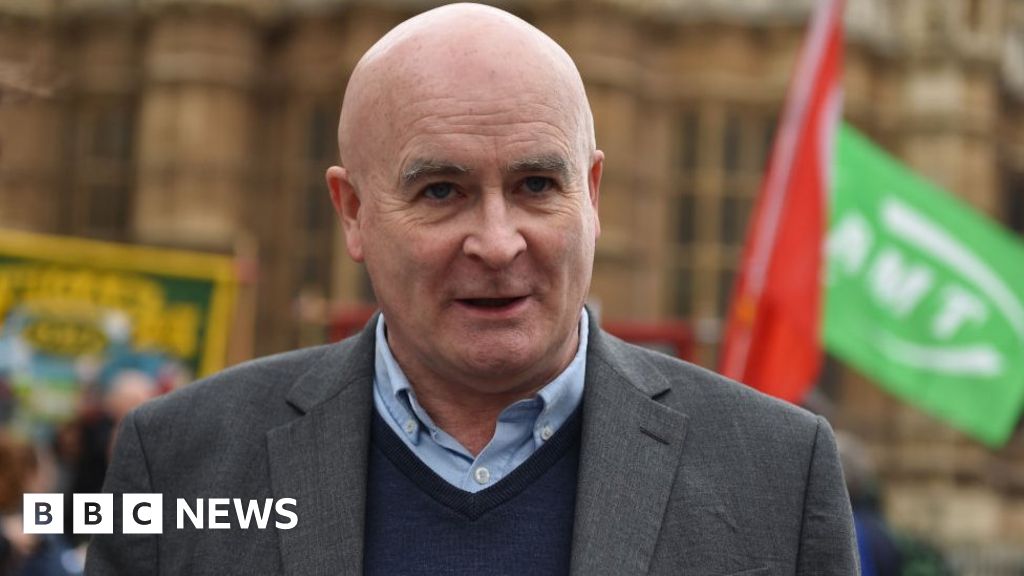Mick Lynch: RMT Leader Hits Out At BBC Train Strikes Coverage

Mick Lynch questioned over strike action pay losses
The boss of the UK's biggest rail union has accused the BBC of showing bias in its coverage of the rail strikes, insisting support for the walkouts amongst its members is not dropping.
In a heated exchange on the Today programme, Mick Lynch refused to answer how much pay union members had lost through strike action.
He accused the BBC of "parroting" the right-wing press.
Presenter Mishal Husain defended the questions, as more strikes take place.
About 40,000 rail workers are walking out on Tuesday, Wednesday, Friday and Saturday as part of a long-running row over jobs, pay and conditions.
During the interview, Mr Lynch was asked what was the average amount of pay lost by union members through strike action.
He replied that it depended on what shift they were working, what rate of pay they earned and how many occasions they walked out, adding that his members were "making a considerable sacrifice".
He went on: "What I do find annoying Mishal is that you put these lines that are directly taken from the propaganda from the other side.
"You never show any admiration for the fight that working people are putting up for our country, for the rebalancing of society. You never criticise the super-rich for what they're doing to nurses, what they're doing to postal workers, and you never seem to take an impartial view on the way this society is balanced at the moment with the complete lack of distribution of wealth in our society."
Husain repeated her question, asking: "You've said your members are making a sacrifice. What's wrong with putting a number on it?"
"Why do you need that number?" Mr Lynch replied, before criticising the line of questioning.
"Why are you pursuing an editorial line I could read in The Sun or The Daily Mail or any of the right-wing press in this country, and you're not pursuing the fact that working people - millions of them - are being impoverished and some of them being made destitute by the attitude of this government and by their employers?
"I find this a shocking stance that the BBC will take - you're just parroting the most right-wing stuff you can get hold of on behalf of the establishment, and it's about time you showed some partiality towards your listeners, to working-class people in this country who are being screwed to the floor by the attitudes and policies of this government."
Husain concluded the interview by saying: "They're called questions."
The BBC declined to comment on the exchange.
Mark Harper asked if he insisted on driver-only operation as part of any union deal
Earlier in the interview, Mr Lynch had called for the government "to facilitate a settlement that says 'let's get real and let's put some stuff to the RMT they can cope with and deal with'".
But the government has said it will not back down, despite the "damage" done.
Transport Secretary Mark Harper told the BBC he was "very disappointed" that the RMT had rejected the latest pay offer "out of hand" and that isn't "a bottomless pot" of money.
"A fair and reasonable offer has been made. We do also need to see reform agreed at the same time," he added.
Most train companies across Britain are likely to be affected by this week's strikes, and Network Rail has urged passengers to "only travel if absolutely necessary".
Travellers are advised to check their train-operating company's website before setting out, with delays and cancellations also likely on the days around the strikes.
There are likely to be no services early in the morning or late at night, with only one in five services operating between 07:30 and 18:30 GMT.
The RMT has held a series of strikes since the summer that have shut much of the rail network in England, Scotland and Wales and threaten to hit businesses in the run-up to Christmas.
It comes as workers in many other industries down tools, with bus drivers, Royal Mail workers, nurses and highways workers and baggage handlers also striking this week.
Rail workers are calling for better conditions and pay rises to match the pace of inflation, with the cost of living rising at its fastest rate for more than 40 years.
But the government has ruled out inflation-linked wage increases, and rail bosses say big changes are needed to modernise the railway.
On Monday, Network Rail, which operates the UK's rail infrastructure, said the union was causing "misery" after its members rejected a fresh pay deal.
From Chip War To Cloud War: The Next Frontier In Global Tech Competition
The global chip war, characterized by intense competition among nations and corporations for supremacy in semiconductor ... Read more
The High Stakes Of Tech Regulation: Security Risks And Market Dynamics
The influence of tech giants in the global economy continues to grow, raising crucial questions about how to balance sec... Read more
The Tyranny Of Instagram Interiors: Why It's Time To Break Free From Algorithm-Driven Aesthetics
Instagram has become a dominant force in shaping interior design trends, offering a seemingly endless stream of inspirat... Read more
The Data Crunch In AI: Strategies For Sustainability
Exploring solutions to the imminent exhaustion of internet data for AI training.As the artificial intelligence (AI) indu... Read more
Google Abandons Four-Year Effort To Remove Cookies From Chrome Browser
After four years of dedicated effort, Google has decided to abandon its plan to remove third-party cookies from its Chro... Read more
LinkedIn Embraces AI And Gamification To Drive User Engagement And Revenue
In an effort to tackle slowing revenue growth and enhance user engagement, LinkedIn is turning to artificial intelligenc... Read more

